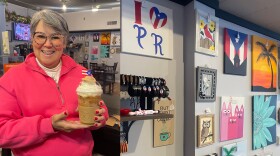Our parents pass many things on to us. Our looks, our habits and sometimes our outlook on life. Lake Effect essayist Jan Wilberg learned some tough lessons from her mother on mental illness, aging and acceptance.
Jan Wilberg is a writer and community activist living in Milwaukee. Her daily blog, Red’s Wrap, deals with politics, feminism, disability, and dogs. Her work has appeared in the New York Times, Newsweek, and several anthologies.
Here’s her essay "My Face, My Beautiful Face":
It was my first time. I had never had anyone fuss with my face, shape my eyebrows, those were things other women did, not me. The woman at the salon studied my face, using a bright light to help her get a closer look like a dentist might do looking for an especially subtle cavity.
After she was done with waxing and tweezing my eyebrows, I asked her a question I’d been wanting to ask an expert for a long time. “Do you think anything can be done about my face?” I was sixty then and had long vertical creases in my cheeks, lines across my forehead, and branches of worry on the side of each eye.
She studied me for a long moment and then stood back, returning the examination lamp to its place. “No,” she said, “I can’t do anything. Maybe a doctor could.” She seemed repelled somehow like she wished she could roll her eyes, but it would be unseemly, not appropriate in front of a paying customer, especially one so unaware, so naive. She turned away and then she said this.
“I bet you wash your face with soap.”
The creases in my mother’s face had been even deeper than mine, so deep that it seemed that her skin had been borrowed from a much larger person and hung on her head by mistake. I remember when the creases in her face were made. I watched from a window in the kitchen while she laid on a lawn chair in the backyard.
She wore a tiny strapless halter top. It was white and just wide enough to cover her mastectomy scars. Running from the bottom of the halter top to the top of her shorts was a long thin scar where surgeons had removed her gallbladder or appendix or had explored. She had had several exploratory surgeries which I envisioned as doctors hunting for something to make real her complaints of illness. There had to be something the matter. We kept asking but she always said, “No, nothing’s the matter.” As a child, I probably asked her that question 10,000 times.
She would wait until noon when it was hottest to go in the backyard. And then she would lay, first on her back and then on her stomach, always in her white halter top and her black shorts, the rest of her body bare, offered up to the heat and the sun. She would lie flat on the lawn chair, perfectly flat, until the sun began to set. She never read or conversed unless I spoke to her, asked her if I could go to my friend's house or whether I should start dinner. She just baked herself until she became brown, my fair, freckled mother became as brown as the table next to me as I write this. Not mahogany, lighter, but just barely as I remember. But I was a child.
My mother was lovely and soft, her toughened brown skin notwithstanding, and she was very gentle, and melancholy, sad nearly all the time, this last thing being what I remember most about her. She gave me her wisdom as much as she could and one important thing was this, “You don’t have to be pretty as long as you’re neat and clean.”
“I bet you wash your face with soap.”
When I got older, I understood why my mother had roasted in the sun, day after scorching day, why she sometimes lay on the couch, facing the wall, for hours on end, so long sometimes I would stop what I was doing to watch her breathing. Was she still breathing, I would wonder, sometimes sitting on the slimmest edge of the couch to rub her shoulder and ask if she wanted me to turn on the television or make her some tea. She always said no, she was fine. But she was not fine, she was never fine, she was deeply and persistently depressed, but eventually I left home for college and I stopped thinking about it all the time.
After I married and had children, the lines on my face deepened every year. They weren’t as extreme as my mother’s, but the time I’d spent in the sun, the afternoons swimming in lakes and then laying on a towel, so pleased to feel the sun on my face, all that added up to skin that was so time and sun-worn only a doctor’s intervention could repair the damage. I considered that, I thought about plastic surgery and Botox shots, wondered what might be possible to restore my face to an earlier version and I emailed my daughter in California and told her of my thinking.
I told her how my face was bothering me and I thought I should try to fix it and what she wrote back made me decide to do nothing. She wrote, “Your face, your beautiful face.”
“I bet you wash your face with soap.”
I still wash my face with soap. I stand in the shower with the hot water streaming and I lather up and wash myself, my arms and legs and chest, and then my face and I let the water run on my face like it is rain falling on grass that has been parched by the sun.





